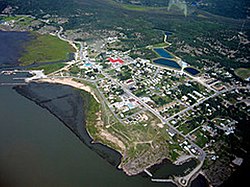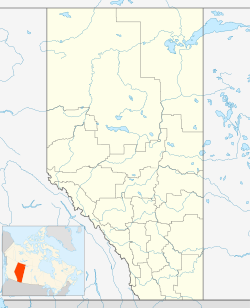Fort Chipewyan, Alberta
| Fort Chipewyan | |
|---|---|
| Hamlet | |

Aerial view of Fort Chipewyan
|
|
| Location of Fort Chipewyan in Alberta | |
| Coordinates: 58°42′52″N 111°09′30″W / 58.7144°N 111.1583°W | |
| Country |
|
| Province |
|
| Region | Northern Alberta |
| Census division | 16 |
| Specialized municipality | RM of Wood Buffalo |
| Settled | 1788 |
| Government | |
| • Type | Unincorporated |
| • Mayor | Melissa Blake |
| • Governing body |
Wood Buffalo Municipal Council
|
| Area (2011) | |
| • Total | 10.23 km2 (3.95 sq mi) |
| Elevation | 221 m (725 ft) |
| Population (2011) | |
| • Total | 847 |
| Time zone | MST (UTC−7) |
| • Summer (DST) | MDT (UTC−6) |
| Postal code | T9K |
| Area code(s) | +1-780 |
| Climate | Dfc |
Fort Chipewyan /ˈtʃɪpəwaɪən, -pwaɪ-/, commonly referred to as Fort Chip, is a hamlet in northern Alberta, Canada, within the Regional Municipality (RM) of Wood Buffalo. It is located on the western tip of Lake Athabasca, adjacent to Wood Buffalo National Park, approximately 223 kilometres (139 mi) north of Fort McMurray.
Fort Chipewyan is one of the oldest European settlements in the Province of Alberta. It was established as a trading post by Peter Pond of the North West Company in 1788. The fort was named after the Chipewyan people living in the area.
One of the establishers of the fort, Roderick Mackenzie of Terrebonne, always had a taste for literature, as was seen years later when he opened correspondence with traders all over the north and west, asking for descriptions of scenery, adventure, folklore and history. He also had in view the founding of a library at the fort, which would not be only for the immediate residents of Fort Chipewyan, but for traders and clerks of the whole region tributary to Lake Athabasca, so that it would be what he called, in an imaginative and somewhat jocular vein, "the little Athens of the Arctic regions." This library, built in 1790, held over 2000 books, and became one of the most famous in the whole extent of Rupert's Land.
...
Wikipedia

